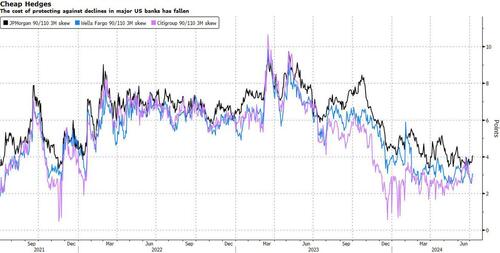Bank Hedges Have Rarely Been Cheaper Before Earnings
By Bre Bradham and Cecile Vannucci, Bloomberg markets live reporter and strategist
JPMorgan Chase & Co., Wells Fargo & Co. and Citigroup Inc. are kicking off the US banks’ earnings season on Friday, and traders are feeling pretty relaxed about it.
The trio of stocks has surged more than 22% this year, yet the options market is showing little concern the rally may stumble. A measure of hedging costs for JPMorgan and Wells Fargo shares is hovering near its lowest level since 2021, while protection for Citigroup is below its one-year average, according to data compiled by Bloomberg.
The biggest US banks have sailed through the Federal Reserve’s annual stress test, and many have increased their payouts to shareholders as the industry awaits a watered-down version of a proposal for stricter capital rules. Results in late June from Jefferies Financial Group Inc. showed momentum building for investment banking, adding to optimism for a recovery after elevated interest rates throttled the pace of dealmaking.
For Morgan Stanley analyst Betsy Graseck, Citigroup, JPMorgan and Wells Fargo are the preferred names among large-cap banks into the earnings. She sees JPMorgan accelerating share repurchases over the coming quarters and potential upside in Wells Fargo’s outlook for net interest income, while Citigroup’s views on buybacks and revenue are likely to be a focus.
“Expect both earnings and forward commentary to add further confirmation that we are still in the early stages of a multi-year global capital markets recovery off of multi-decade lows versus nominal GDP,” Graseck wrote in a note, adding that banks don’t have “heroic assumptions” for loan growth this year.
When it comes to volatility following the results, options are pricing in stock moves more or less in line with what was seen after past reports. The market is currently expecting the biggest swings from Wells Fargo and Morgan Stanley — 3.4% gains or drops that match their average move following the last eight earnings.
The expectations for muted swings in bank stocks come as the broader market has been generally serene, with the Cboe Volatility Index recording its lowest average reading since 2017 in the first half. What’s more, July is known to be particularly calm for equities: In the past 15 years, the VIX has had its lowest average daily reading during this month.
Following the last expiration, the number of options outstanding on JPMorgan, Citigroup and Wells Fargo has slumped, another indication that positioning remains light before the results. The open interest on JPMorgan’s options is near a five-year low, while for Citigroup it hit the lowest since the start of 2022 and for Wells Fargo it’s near its lowest since January.
“The set up looks very good for the banks over the next 18 months,” RBC Capital Markets analyst Gerard Cassidy wrote in a note. The Federal Reserve is expected to cut interest rates and banks’ funding costs could start to fall, while the US economic expansion will help boost loan growth. RBC also sees lenders returning excess capital via buybacks and dividends. “We continue to recommend investors overweight bank stocks in portfolios.”
Tyler Durden
Tue, 07/09/2024 – 08:35

